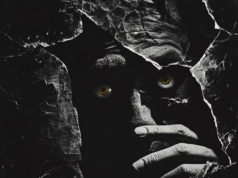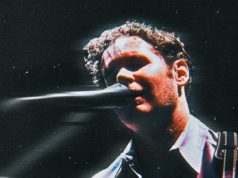I’m right there with you. I need my daily dose of Baby Boomer bullshit to carry me through the day, and Spotify does right by that. I just don’t like how the streaming giant is crafting new ways to exploit local artists, whom I love and appreciate.
“Some artists that used to do well in the past may not do well in this future landscape,” Spotify CEO Daniel Ek recently told Music Ally. “You can’t record music once every three to four years and think that’s going to be enough. The artists today that are making it realize that it’s about creating a continuous engagement with their fans. It is about putting the work in, about the storytelling around the album, and about keeping a continuous dialogue with your fans.”
Critic/author Steven Hyden tweeted, “Leech complains that host body is not producing enough blood.”
British artist Shura has said that while Ek is right in some respects, he’s a whole world wrong in every other way: “People will struggle if all they do is release a record every three years, as I did. I didn’t really release music between my first and second record, and it was more difficult than if I’d kept releasing music. It wasn’t impossible, but it’s definitely a bigger mountain to climb. We do need to work more, but that’s not going to be possible for a lot of people. The system that Daniel Ek is talking about can work, but it can only work for a small group of artists, so he’s got a point. It’s just that his point sucks.”
Spotify is valued at around $27 billion — “billion” with a “b” — and Ek’s personal wealth is estimated to be about $4 billion, again with that pesky little-but-really-big “b.” Artists are paid $0.00437 per stream on Spotify, meaning that to make minimum wage, an artist would need to reach 360,000 streams per month, which means The Royal Sons and Polydogs, and Mean Motor Scooter and Son of Stan and every other big local/regional band, would need to be, well, the Eagles or AC/DC.
(In all fairness, Amazon Music pays, like, $0.00436 per stream, and their CEO makes more money every day than every Lotto winner in history combined.)
OK, so basically, it’s time for all you slacker jackwagon musicians to stop trying to put food on the table and stop trying to make rent (during a pandemic, when rent should be put on hold — thanks, tRump) and pick up your instruments and crank out some new rocking tunes! To keep Daniel Ek afloat in yachts, houses, and Dak Prescott-approved mattresses! And this is all before the point when I tell that Spotify is inviting non-famous artists to the dance … for a price. There’s always a price.
There’s a new Spotify feature for artists and labels seeking more exposure on the streaming service. Spotify’s algorithmic music selector to which the app defaults on the radio and autoplay functions will welcome creators at all levels … for a price.
In a statement, the service says the “new experiment” will allow artists and labels to “identify music that’s a priority for them, and our system will add that signal to the algorithm that determines personalized listening sessions” … for a price.
And while there are no upfront costs, that price is … lowered royalty payments.
“Labels or rights holders agree to be paid a promotional recording royalty rate for streams in personalized listening sessions where we provided this service,” Spotify says in the statement.
Essentially, as you have no doubt guessed, Spotify is asking for free music. Worse, accepting the new terms “won’t guarantee placement to labels or artists,” the service says.
Artists, naturally, are less than impressed.
“Sounds like Spotify is just trying to continue to rip off artists under the guise of helping them get more exposure,” said Aaron Bartz, frontman of O. Deletron and Tame … Tame and Quiet and the main force behind Submerged Capital Records, a local archival project. “The union push to get more per listen is quaint, but let’s be real. These services and algorithms are really only good for anyone or any label with a marketing system in place to spend all their time finding ways to manipulate the algorithms to make more money. It’s modern technology’s equivalent to payola, without ever having to meet anyone face to face or actually liking what artists are producing.”
Bartz, who formed his label only recently, has uploaded once-thought-lost records from Benway, Sonic Death Monkee, and more to Spotify. “Artists and small labels like mine that are putting stuff on these platforms aren’t doing it for the money. In my case, it’s so fans around here have access to old or unreleased local stuff. There is no expectation that we’re reviving careers or allowing people to quit their day jobs. That era of the music industry is over without personal innovation and choices by active bands.”
Zola Jesus believes Spotify is not in the business of launching careers. In Vice, the non-local singer-songwriter said, “We’re the ones that are driving the entire system. Without new content, there’s no new traffic. The more artists, the better. The more songs, the better. The more content, the more profit. But we cannot ignore the consequences of a market saturated with shitty music.”
Royal Sons frontman Blake Parish sees the con. “Didn’t I already say, ‘Be fucked or stay fucked’? I think this applies as well. This reminds me of having the option of being robbed at gunpoint and then deciding whether I’d like the additional option of being robbed at knifepoint. ‘We got everything in your pockets? Do you have any extra gold in your teeth? How about a newborn we can sell?’ Goddamn man, what else can they take?”
Parish thinks that after the $75 per year his band receives from Spotify, they can “sign up to personalize our account to maybe, probably, get robbed for more later.”
In an open letter, the Union of Musicians and Allied Workers suggested a new tack for the streaming giant. The trade group representing more than 4,000 independent artists said Spotify needs to pay artists at least one cent per stream, among other things. “Music workers create all of the enormous wealth Spotify accumulates for its CEO, its investors, and the major labels, but we artists continue to be underpaid, misled, and otherwise exploited by the company.”
Robby Rux from Dreamy Life Records (Mean Motor Scooter, Sur Duda, Ting Tang Tina) said the Spotify plan could be “a good thing for independent artists and smaller labels to help get more exposure. It’s just sad that they are taking money off the back-end royalties. They already don’t pay much for royalties as it is. It’s a really bad time for Spotify to propose such a plan. Most musicians’ income comes from touring, and that’s all shut down with the pandemic.”












